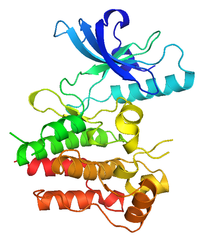| muscle, skeletal, receptor tyrosine kinase | |||||||
|---|---|---|---|---|---|---|---|
 | |||||||
| Identifiers | |||||||
| Symbol | MUSK | ||||||
| NCBI gene | 4593 | ||||||
| HGNC | 7525 | ||||||
| OMIM | 601296 | ||||||
| RefSeq | NM_005592 | ||||||
| UniProt | O15146 | ||||||
| Other data | |||||||
| Locus | Chr. 9 q31.3-q32 | ||||||
| |||||||
MuSK (for Muscle-Specific Kinase) [1] is a receptor tyrosine kinase required for the formation and maintenance of the neuromuscular junction. [2] It is activated by a nerve-derived proteoglycan called agrin, [3] which is similarly also required for neuromuscular junction formation. [4]
MuSK signaling
Upon activation by its ligand agrin, [5] MuSK signals via the proteins called casein kinase 2 (CK2), [6] Dok-7 [7] and rapsyn, to induce "clustering" of acetylcholine receptors ( AChR). Both CK2 and Dok-7 are required for MuSK-induced formation of the neuromuscular junction, since mice lacking Dok-7 failed to form AChR clusters or neuromuscular synapses, and since downregulation of CK2 also impedes recruitment of AChR to the primary MuSK scaffold. In addition to the proteins mentioned, other proteins are then gathered, to form the endplate to the neuromuscular junction. The nerve terminates onto the endplate, forming the neuromuscular junction - a structure required to transmit nerve impulses to the muscle, and thus initiating muscle contraction.
Role in disease
Antibodies directed against this protein (Anti-MuSK autoantibodies) are found in some people with myasthenia gravis not demonstrating antibodies to the acetylcholine receptor. [8] The disease still causes loss of acetylcholine receptor activity, [9] but the symptoms affected people experience may differ from those of people with other causes of myasthenia gravis.[ citation needed]
References
- ^ Valenzuela DM, Stitt TN, DiStefano PS, Rojas E, Mattsson K, Compton DL, Nunez L, Park JS, Stark JL, Gies DR, Thomas S, LeBeau MM, Fernald AA, Copeland NG, Jenkins NA, Burden SJ, Glass DJ, Yancopoulos GD (Sep 1995). "Receptor tyrosine kinase specific for the skeletal muscle lineage: expression in embryonic muscle, at the neuromuscular junction, and after injury". Neuron. 15 (3): 573–584. doi: 10.1016/0896-6273(95)90146-9. PMID 7546737. S2CID 17575761.
- ^ DeChiara TM, Bowen DC, Valenzuela DM, Simmons MV, Poueymirou WT, Thomas S, Kinetz E, Compton DL, Rojas E, Park JS, Smith C, DiStefano PS, Glass DJ, Burden SJ, Yancopoulos GD (May 1996). "The receptor tyrosine kinase MuSK is required for neuromuscular junction formation in vivo". Cell. 85 (4): 501–512. doi: 10.1016/s0092-8674(00)81251-9. PMID 8653786. S2CID 17455481.
- ^ Glass DJ, Bowen DC, Stitt TN, Radziejewski C, Bruno J, Ryan TE, Gies DR, Shah S, Mattson K, Burden SJ, DiStefano PS, Valenzuela DM, DeChiara TM, Yancopoulos GD (May 1996). "Agrin acts via a MuSK receptor complex". Cell. 85 (4): 513–523. doi: 10.1016/s0092-8674(00)81252-0. PMID 8653787. S2CID 14930468.
- ^ Gautam M, Noakes PG, Moscoso L, Rupp F, Scheller RH, Merlie JP, Sanes JR (May 1996). "Defective neuromuscular synaptogenesis in agrin-deficient mutant mice". Cell. 85 (4): 525–535. doi: 10.1016/s0092-8674(00)81253-2. PMID 8653788. S2CID 12517490.
- ^ Glass DJ, Bowen DC, Stitt TN, Radziejewski C, Bruno J, Ryan TE, Gies DR, Shah S, Mattson K, Burden SJ, DiStefano PS, Valenzuela DM, DeChiara TM, Yancopoulos GD (May 1996). "Agrin acts via a MuSK receptor complex". Cell. 85 (4): 513–523. doi: 10.1016/s0092-8674(00)81252-0. PMID 8653787. S2CID 14930468.
- ^ Cheusova T, Khan MA, Schubert SW, Gavin AC, Buchou T, Jacob G, Sticht H, Allende J, Boldyreff B, Brenner HR, Hashemolhosseini S (Jul 2006). "Casein kinase 2-dependent serine phosphorylation of MuSK regulates acetylcholine receptor aggregation at the neuromuscular junction". Genes & Development. 20 (13): 1800–16. doi: 10.1101/gad.375206. PMC 1522076. PMID 16818610.
- ^ Okada K, Inoue A, Okada M, Murata Y, Kakuta S, Jigami T, Kubo S, Shiraishi H, Eguchi K, Motomura M, Akiyama T, Iwakura Y, Higuchi O, Yamanashi Y (Jun 2006). "The muscle protein Dok-7 is essential for neuromuscular synaptogenesis". Science. 312 (5781): 1802–5. Bibcode: 2006Sci...312.1802O. doi: 10.1126/science.1127142. PMID 16794080. S2CID 45730054.
- ^ Hoch W, McConville J, Helms S, Newsom-Davis J, Melms A, Vincent A (Mar 2001). "Auto-antibodies to the receptor tyrosine kinase MuSK in patients with myasthenia gravis without acetylcholine receptor antibodies". Nature Medicine. 7 (3): 365–8. doi: 10.1038/85520. PMID 11231638. S2CID 18641849.
- ^ Barrett-Jolley R, Byrne N, Vincent A, Newsom-Davis J (Oct 1994). "Plasma from patients with seronegative myasthenia gravis inhibit nAChR responses in the TE671/RD cell line". Pflügers Archiv. 428 (5–6): 492–8. doi: 10.1007/BF00374570. PMID 7838671. S2CID 5611563.